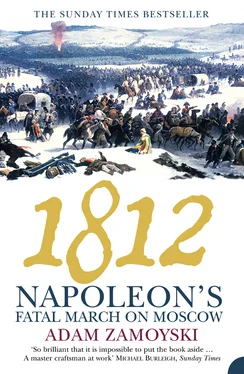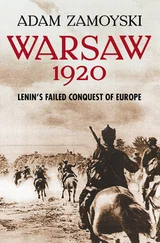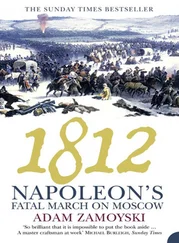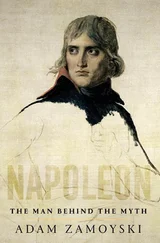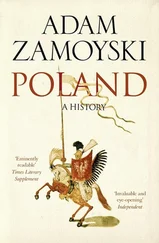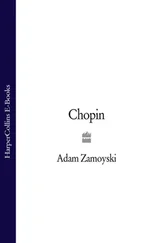His behaviour and his policies were rapidly losing Napoleon the dominion over hearts and minds he had enjoyed in earlier years, while a great internationale of alienated people all over Europe was gathering, bound together only by their detestation of him. Even Wellington was beginning to see and to portray his war against Napoleon in Spain as a part of some kind of moral crusade. 12
None of this was of any immediate consequence, and Napoleon’s position in Europe was still paramount. He controlled his vast imperium through a web of loyalty, beginning with his crowned brothers. He had created all over Europe a new international aristocracy beholden to him, endowed with fiefs which had fallen vacant through the mediatisation of the Holy Roman Empire or through conquest, and by 1812 the imperial almanac listed four princes, thirty dukes, nearly four hundred counts and over a thousand barons, not including the titles Napoleon had given to members of his own family.
It is also worth noting that he had many natural allies bound to him by self-interest of one sort or another. Frederick William and Hardenberg feared the social upheaval that might result from any national revival more than they resented Napoleon. Others in Germany and Europe as a whole feared the relentless onward march of Russian expansion and believed that a weakening of French influence would entail Russian hegemony, and distrusted Alexander’s motives. 13
Napoleon’s spies nevertheless kept a close watch on potential subversives all over Germany and on the support they were receiving from Russia. By the summer of 1810 he was growing irritated by the numbers of Russians visiting European courts and capitals trying to incite people against France. In Vienna, the former ambassador Count Razumovsky, the salonière Princess Bagration and Napoleon’s old Corsican enemy Pozzo di Borgo, now in Russian uniform, made up a real propaganda network between them. Others were rallying anti-Napoleonic sentiment in the watering places of Germany. He asked Alexander to recall them all to Russia, but received scant satisfaction.
In November 1810 Talleyrand’s successor as Foreign Minister, Jean-Baptiste de Champagny, reported to Napoleon that ‘a vast revolution’ was brewing in Germany, fuelled by national hatred of France. This gathered in strength as tension between France and Russia mounted, and as the Continental System began to bite. Although he tended to make light of the threat, Napoleon was beginning to take more serious note of it, and declared his intention of ‘uprooting the German national spirit’. And the only way he would be able to ‘uproot’ this burgeoning growth was by cutting off its chief source of nourishment, which came from Russia. 14
At Erfürt, Napoleon had in an offhand way asked Caulaincourt what he thought Alexander might think of a dynastic union between the two empires. He did not seem to attach much importance to the matter, but came back to it a couple of times. This did not surprise Caulaincourt. Ever since Napoleon had assumed the imperial crown, the question of an heir had presented itself, and as the Empress Josephine was no longer of childbearing age, there had been much talk of a divorce. After Tilsit, gossip had it that he might marry one of the Tsar’s sisters to cement the new entente .
Alexander had two unmarried sisters, the Grand Duchess Catherine, who was charming, witty and highly regarded, and the Grand Duchess Anna, who was only fourteen years old. Before his assassination, their father had issued a special ukaz giving his consort, now the Dowager Empress, absolute power to decide whom their daughters married. She loathed Napoleon, and in 1808, no doubt alarmed by the gossip, quickly found a husband for Catherine. Shortly after Alexander’s return from Erfürt, the Grand Duchess was married to Prince George of Holstein-Oldenburg.
This did not bother Napoleon, who had anyway been thinking of the younger sister. He was in no hurry, and he wanted to keep his options open. It also suited Alexander, permitting him to express a degree of enthusiasm for the idea of the marriage, knowing that he need not commit himself for some years.
But as the cracks in the alliance began to show, Napoleon decided to paper them over with a dynastic union. At the end of November 1809 he instructed Caulaincourt to approach Alexander with a request for his sister’s hand. Alexander’s response was positive, but he took the matter no further. When Caulaincourt pressed him for a definite answer, he asked for two weeks to consider the matter and to gain his mother’s approval. At the end of the two weeks, he asked for another ten days. Then another week. At the beginning of February 1810 he was still stalling, saying that his mother objected on the grounds that Anna was too young. Napoleon, who felt insulted by the lack of enthusiasm he sensed in Alexander and was beginning to suspect that he would never agree to the match, decided to pre-empt the humiliation of a refusal by turning to Austria instead.
He had sounded out the Austrian court on the subject in a vague way in the previous year, so he could now act with speed. After reading the despatches from Caulaincourt describing Alexander’s negative response on the morning of 6 February, he summoned Prince Karl von Schwarzenberg, the Austrian ambassador in Paris, and pinned him down for a binding decision straight away. Schwarzenberg seized what he believed was a historic chance, and, overstepping his powers, gave him the reply he wanted. The courier bearing Napoleon’s letter to Alexander notifying him of the change of plan crossed with one from the Tsar bearing a letter in which he in effect refused Napoleon’s offer, explaining that his mother felt there could be no question of marrying off Anna for at least two years.
When he heard the news of Napoleon’s betrothal to Marie-Louise, Alexander assumed that he had been carrying on parallel negotiations with Austria all along, and was stung by the apparent duplicity. It is almost certain that Napoleon would have preferred to marry the Grand Duchess Anna, as it would have had tremendous resonance as a symbolic marriage of East and West reuniting the two halves of the Roman Empire. But as his marriage to Marie-Louise went ahead, absorbing the attention of Europe with its pomp and éclat , Alexander was made to look ridiculous in front of his own people. He had stood up for the entente with Napoleon in the face of almost universal opposition at home, only to end up in the role of jilted party. And the marital junketing going on in Paris appeared to hide a deeper threat.
At the marriage feast the Austrian Chancellor Count Metternich, who was representing his imperial master, stood up and raised his glass ‘To the King of Rome!’, thereby expressing the hope that Napoleon would produce an heir, and ceding the old imperial title to the house of Bonaparte. From St Petersburg it looked very much as though France and Austria were entering into an alliance even closer than the special relationship forged at Tilsit. An unpleasant sign of the way public opinion was swinging was that a Russian loan which Alexander was trying to float on the Paris exchange in order to raise much-needed funds suddenly found no subscribers. And the new situation had other implications. 1
When Alexander was approached on the subject of the marriage of his sister, he had let it be known that he would make his agreement conditional on a convention ruling out forever the restoration of a Kingdom of Poland. Napoleon had responded positively, quite happy to trade Poland for Anna. But now Alexander had lost his main bargaining counter in this matter of crucial importance.
Napoleon’s creation of the Grand Duchy of Warsaw in 1807 had, in effect, introduced the first material conflict of interest between France and Russia. The new political unit inevitably raised the possibility of a restoration of the Kingdom of Poland. Such a restoration would entail the loss by Russia of some if not all of her acquisitions at the expense of Poland in the partitions – an area of 463,000 square kilometres with a population of some seven million.
Читать дальше
